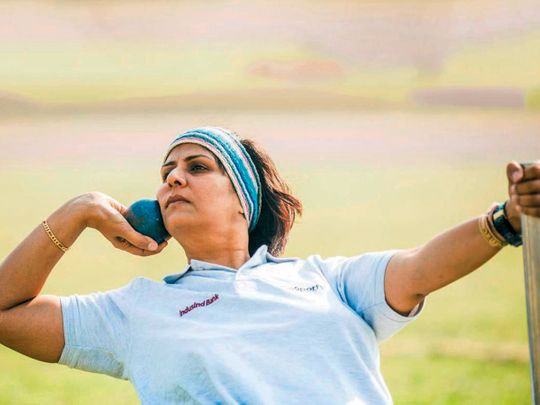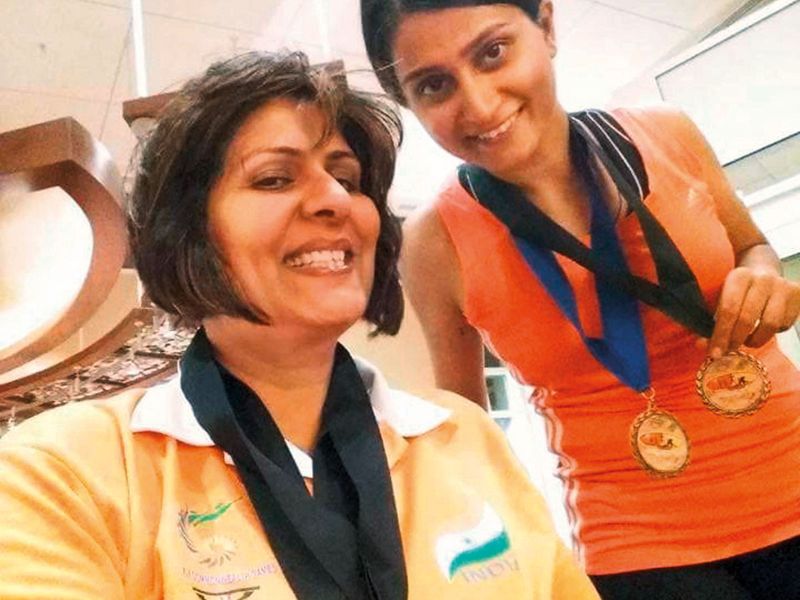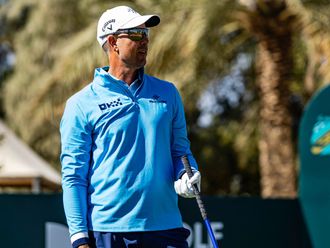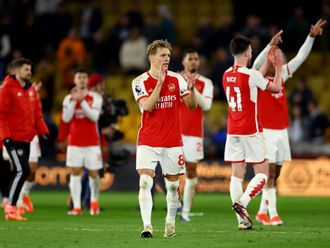
Dubai: When Deepa Malik wheels her way into the imposing Rashtrapati Bhavan (presidential palace) on Thursday to collect the Rajiv Gandhi Khel Ratna award from India’s President Ramnath Kovind — there is no doubt that the loudest cheers of the afternoon will be reserved for her. Not because it’s the highest sporting honour for any active sportsperson in India, but an overdue recognition of what this feisty woman stands for.
She is not the first Paralympian, mind you, to be bestowed with this honour — it was her teammate Devendra Jajharia who was conferred with it in 2017 for winning the javelin gold in his category at the Rio Paralympics the previous year. Deepa, then a 46-year-old and paralysed from below her chest for many years, hurled the shot put in her F-53 category to a silver medal to become the first Indian woman medallist in Paralympics.
As someone who has been bred in the army philosophy of teamwork before personal glory (her father is late Colonel B.K. Nagpal and husband is Colonel Bikram Singh), India’s most celebrated Paralympian is not bothered that her recognition came a good three years after her Rio heroics. “Devendra’s performance was matchless — he won the gold with a record and is a legend. In my case, it’s heartening to see that the judges had done the due diligence to see what I had achieved over a period from 2014 to 2018 and not just the Olympics.
“It’s surely a recognition of the fact that disability sport is finding it’s feet in the mainstream in India,” Deepa said during a phone interview with Gulf News.
It comes as no surprise really that Bollywood is planning a biopic on her — for the course that she had charted for herself in life against all odds has all the elements of a blockbuster script. Life had been a busy, social one with a caring husband and two young daughters until disaster struck some 19 years ago when she had to undergo a major surgery for a spinal tumour, which saved her life, but left her paralysed from below the chest. As many as three surgeries were required and she received 183 stitches on her back over the spinal column!
As a bedridden Deepa was slowly coming to terms with her trauma, her elder daughter Devika — then barely seven — was diagnosed with signs of hemiplegia on her left side, which limits the movement of arms and legs. The resilience of character shown by Deepa and her husband taught Devika to embrace life head on, and somewhere down the road the two went on to become the only mother-daughter pair of Paralympians the world has known.
If this is not stuff out of the movies, then what is?

The seasoned professional in me is too overwhelmed to ask how she lived through all those years, but there not a bone of negativity — nor self-pity — in Deepa. “I wanted my children to be happy and positive people. Just because we treated it right, with happiness and positivity, disability has given us an abundance in return. I am so happy that I could pass it on that it’s all right to be different,” she said, leaving me stumped.
There would certainly be no dearth of stories of pushing the boundaries among the differently abled athletes — but it will be difficult to find another person like Deepa who has lived such a full life despite being forced to move on a wheelchair for nearly two decades now.
“Fortunately, the spirit of adventure has never left me. I had been a swimmer and a motor rallyist at the Raid de Himalaya before taking up athletics full time in 2009,” she says about her journey. What possibly slipped her mind was that she had also walked the ramp on a wheelchair.
Her switch to the athletics stage had been most fruitful — where she specialised in javelin and shot put and landed a silver on her debut at the Asian level in Guangzhou in 2010. “I have won medals in javelin in the last three Asian Para Games, Grand Prix — apart from the shot put silver in Rio. Only when told that neither of my favourite events will be there in my category at the Tokyo Paralympics next year, I switched to discus where I won a bronze in the last Asian Para Games in Jakarta,” she said.
However, her doctors have advised her against taking up discus at the competitive level in future as it could cause a “serious injury” to her already severely damaged spinal chord. Tokyo would be out of bounds for her. But Deepa — who turns 50 next year — has no plans of slowing down yet. “There are of course the Asian Para Games and Grand Prix events in my disciplines. I also plan to take up sea swimming at a personal level and have been training in Maldives as I need warmer sea waters,” she fills me in with all enthusiasm.
The Paralympics world, meanwhile, has a special place for Deepa and the International Paralympic Committee (IPC) has chosen her as the ‘Woman of the Year’ for 2019. They will be conferring the award on her during the IPC Congress in Germany in October while her role as a member of the Athletic Council will also see her flying down to the Colorado Springs Olympic Centre soon.
So how does she multi-task between being a mother, an exceptional athlete and in an official’s role? “I have perfected the art of time management and believe in punctuality. As I am speaking to you, I am paying my weekly visit to my in-laws’ place,” she signed off with a hearty laugh.
Superwoman? There are not very many who have done better.
Devika Malik: Where there is a will...
There is little doubt that Devika Malik, now 28, has inherited the missionary zeal to be a champion for the cause of disabled ones from her mother Deepa. Born with hemiplegia, which meant her movement was impaired on the left side of the body, Devika was egged on by her mother to take up para-athletics and she went on to win eight medals in national and international events between 2011 and 2016.
She co-founded the Wheeling Happiness Foundation in 2014, an NGO that supports and enables people in disability sport by providing them equipment and helps them overcome other challenges like emotional, social and financial problems. They also work in collaboration with Rotary Club, Lions Club, Smile Train and actor Shah Rukh Khan’s Meer Foundation to help the beneficiaries.
A high point in her career was when she received the Queen’s Young Leader award for her contribution to disability sport from Queen Elizabeth at the Buckingham Palace in 2015. She was also among the speakers before the Commonwealth Heads of State, including Indian Prime Minister Narendra Modi, in the opening ceremony about disability last year.
“I have quite literally been following on my mother’s footsteps. I think that’s been my whole life,” Devika told Gulf News.










